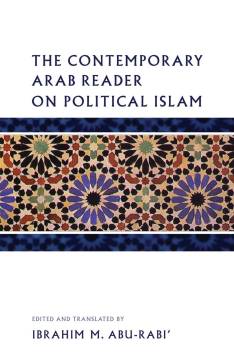
Additional Information
Book Details
Abstract
The Contemporary Arab Reader on Political Islam brings together the writings of highly influential figures in the field of Islamism in the contemporary Arab world, many of whose writings have never been available before in English.
Addressing the key issues such as human rights, civil society, secularism, globalisation and ummah, and the impact of the West on the modern Arab world, this is the perfect starting point for students and academics looking to understand 'Political Islam' in contemporary Arab and Muslim societies.
The contributors include such important Islamist thinkers and activists as Abdullah Azzam, central to the spread of Islamism in Afghanistan, Sayyid Muhammad Hussain Fadlallah, a major Shiite figure in contemporary Lebanon and Ahmad Bin Yousuf, a political advisor to Akram Haniyya in Gaza.
'The most enlightening documents that I have ever read. The ideological and geographic range of the essays is unmatched in its richness and analytical depth'
Ghada Hashem Talhami, D. K. Pearsons Professor of Politics, Emerita
Lake Forest College.
'Draws together the seminal writings on Islamism from across the Arab world. Finally, in one volume, we can engage the foundational and current thinking of a diverse movement'
David J. Goa, Director, Chester Ronning Centre for the Study of Religion & Public Life, University of Alberta, Canada.
'A fascinating examination of a range of Arab interpretations of Islam and Islamism, including reflections on jihad, Israel/Palestine, and responses to the West since 9/11'
Jane Smith, Harvard Divinity School
'An excellent collection of recent articles, originally written in Arabic by contemporary Islamist thinkers and never-before-seen by an English-speaking audience'
Baha Abu-Laban, Professor Emeritus of Sociology, University of Alberta
'Presents a needed and valuable world view of Islamism, as presented by many of its leading thinkers and ideologues'
Norton Mezvinsky, Emeritus Professor of History and President, International Council for Middle East Studies.
'Opens up a panorama of modern political thought that we scarcely knew existed. The result is an absolutely indispensable compendium on contemporary Islamist movements that no student of current affairs on a global scale can ignore'
Hamid Dabashi, the Author of Islamic Liberation Theology: Resisting the Empire (2008)
Table of Contents
| Section Title | Page | Action | Price |
|---|---|---|---|
| Cover | Cover | ||
| Contents | v | ||
| Editor’s Introduction - Islamism from the Standpoint of Critical Theory | vii | ||
| Part I - Toward a Theoretical Appreciation of Islamism in the Contemporary Arab World | 1 | ||
| 1. Salafiyyah is a Blessed Historical Phaserather than an Islamic Legal School | 3 | ||
| 2. The Islamic Movement: Problems and Perspectives | 6 | ||
| 3. Toward aModern Islamic Perspective: A Declaration of Principles | 21 | ||
| 4. The Headscarf Battle | 28 | ||
| Part II - Islamism, Jihad, and Martyrdom | 35 | ||
| 5. The Birth of Afghan Arabs | 37 | ||
| 6. What Jihad Taught Me | 42 | ||
| 7. Preparing the Appropriate Climate for Jihad | 48 | ||
| 8. Islam and the Logic of Power | 56 | ||
| Part III - Islamism and the Question of Israel/Palestine | 63 | ||
| 9. Islam and Zionism | 65 | ||
| 10. From Basel to Oslo: Zionism and the Islamic Narrative | 70 | ||
| 11. The Role of the Israeli Lobby | 85 | ||
| Part IV - Contemporary Islamism: Trends and Self-Criticism | 109 | ||
| 12. Islam between Ignorant Followers and Incapable Scholars | 111 | ||
| 13. The Islamic Movement and the Tasks of the Current Period | 119 | ||
| 14. The Present Rulers and Islam | 124 | ||
| 15. The Islamic Movement’s Performance in Crisis: Assessment and Strategic Outlook | 127 | ||
| 16. Islamic Movements: Self-Criticism and Reconsideration | 130 | ||
| 17. Extremism: The Accusation and the Reality | 135 | ||
| 18. The Islamic Movement: Hopes and Aspirations | 139 | ||
| Part V - Islamism, the West, the United States, and 9/11 | 147 | ||
| 19. The Imperialist Epistemological Vision | 149 | ||
| 20. Islamists and the West: From Confrontation to Cooperation | 160 | ||
| 21. On Modernity, Liberalism, and Islamism | 173 | ||
| 22. The Islamic Movement’s Approach to Understanding Shari’ah | 178 | ||
| 23. The Islamic Movement Before and After September 11, 2001 | 185 | ||
| 24. Muslim Youth and the West | 193 | ||
| Part VI - Islamism in the Contemporary Arab World | 201 | ||
| 25. Islam and Saudi Paganism | 203 | ||
| 26. Definite Proof of the Illegitimacy of the Saudi State | 208 | ||
| 27. How Was the Caliphate Destroyed? | 215 | ||
| 28. Recent Changes in the Arab-Islamist Movements | 218 | ||
| 29. The Moroccan Islamic Movement: Rising or Declining? | 225 | ||
| 30. The Syrian Muslim Brotherhood: Experiences and Prospect | 231 | ||
| 31. Toward a Common Arab and Islamic Strategy for the Middle East | 241 | ||
| 32. Islamist Political Parties in Contemporary Algeria | 247 | ||
| 33. The Islamic Movement in the Gulf Region | 272 | ||
| 34. The Islamic Movement in Modern Iraq: The Sunnite Dimension | 283 | ||
| 35. The Ideational World and its Impressedand Expressed Ideas | 292 | ||
| List of Contributors | 303 | ||
| Bibliography | 306 | ||
| Index | 308 |
